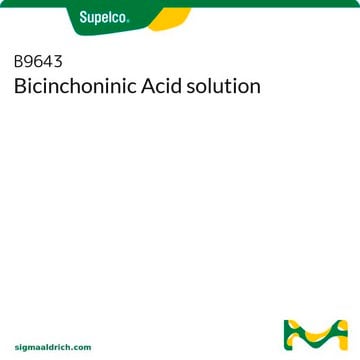C2284
Copper(II) sulfate solution
4 % (w/v) (prepared from copper (II) sulfate pentahydrate)
Synonym(s):
Cupric sulfate standard
About This Item
Recommended Products
form
liquid
reaction suitability
reagent type: catalyst
core: copper
concentration
4 % (w/v) (prepared from copper (II) sulfate pentahydrate)
pH
4
suitability
suitable for determination of total protein (Recommended use with BCA solution (B9643) for total protein determination.)
storage temp.
room temp
SMILES string
[Cu++].[O-]S([O-])(=O)=O
InChI
1S/Cu.H2O4S/c;1-5(2,3)4/h;(H2,1,2,3,4)/q+2;/p-2
InChI key
ARUVKPQLZAKDPS-UHFFFAOYSA-L
Looking for similar products? Visit Product Comparison Guide
Application
- Structural Simulation and Performance Evaluation of a Novel Synthesized ZIF in the Adsorption of MO from Aqueous Solutions: This paper evaluates a newly synthesized zeolitic imidazolate framework (ZIF), incorporating copper(II) sulfate for enhanced adsorption of methyl orange from water, demonstrating its efficacy in water purification technologies (Ravankhah and Fathi, 2024).
Packaging
Suitability
Signal Word
Danger
Hazard Statements
Precautionary Statements
Hazard Classifications
Aquatic Acute 1 - Aquatic Chronic 1 - Eye Dam. 1
Storage Class Code
12 - Non Combustible Liquids
WGK
WGK 3
Flash Point(F)
Not applicable
Flash Point(C)
Not applicable
Certificates of Analysis (COA)
Search for Certificates of Analysis (COA) by entering the products Lot/Batch Number. Lot and Batch Numbers can be found on a product’s label following the words ‘Lot’ or ‘Batch’.
Already Own This Product?
Find documentation for the products that you have recently purchased in the Document Library.
Customers Also Viewed
Protocols
To determine protein content, the Warburg-Christian method refers to measuring protein samples at 280 nm using a spectrophotometer.
To determine protein content, the Warburg-Christian method refers to measuring protein samples at 280 nm using a spectrophotometer.
To determine protein content, the Warburg-Christian method refers to measuring protein samples at 280 nm using a spectrophotometer.
To determine protein content, the Warburg-Christian method refers to measuring protein samples at 280 nm using a spectrophotometer.
Related Content
Protein quantification methods, reagents, and immunoassay technology for accurately measuring the protein concentrations in a variety of samples.
Protein quantification methods, reagents, and immunoassay technology for accurately measuring the protein concentrations in a variety of samples.
Protein quantification methods, reagents, and immunoassay technology for accurately measuring the protein concentrations in a variety of samples.
Protein quantification methods, reagents, and immunoassay technology for accurately measuring the protein concentrations in a variety of samples.
Our team of scientists has experience in all areas of research including Life Science, Material Science, Chemical Synthesis, Chromatography, Analytical and many others.
Contact Technical Service











